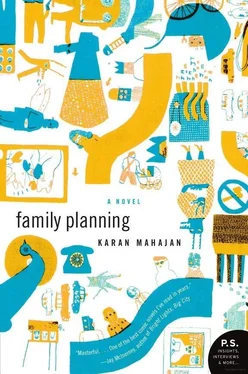“The culture is so rich,” Aarti continued. “What do we Hindus have in Delhi? It’s really boring being a Hindu. All the temples — well, except Hanuman Mandir — were built like two days ago. And then we don’t have any strict traditions. You can do what you want and you don’t have to do what you don’t want. That’s why I get bored when my Dadi goes to the temple. I know nothing bad will happen if I don’t pray.” She sighed. “Do you know — sometimes I wish I was a Muslim.”
“Well—”
“What? You think I’m weird?” she said, bobbing her satchel up in defiance.
“No — you’re damn boring.”
“Shut up.” She giggled.
“But can I tell you a secret?” said Arjun.
They passed through an arch into the main courtyard of the dargah. It was unremarkable to Arjun. It looked like the inside of one of those long filthy tiled old Delhi kothis that his father sometimes visited to massage constituents and local chieftains. In the middle of the courtyard was a tiny tomb.
“What?” said Aarti.
“Promise you won’t tell anyone?”
“Yes—”
“I was born a Muslim,” Arjun blurted.
She didn’t know what to make of this. In the shadows of the buildings her face was softened; he felt he could reach out and touch it and it might fall through his fingers like a curl of smoke.
“I mean. I’m like them”—he nodded toward the boys diving from ledges—“down there. I’m circumscribed. I mean, circumcised. Sorry, am I disturbing you? No? Good. We are adults; we can say these things. But I was adopted by a Hindu family. That’s why I never tell you about my family. I’m actually adopted. My real mother died when I was three.”
He had said it and yet the statement seemed curiously lacking in weightiness. He himself could feel nothing for Rashmi; he had lost only an abstraction.
“I’m so sorry,” she said.
“It’s okay. I’m a stepson — I’ve always been treated like one. I have twelve brothers and sisters, and I’m forced to do all the work and take care of them. That’s why I needed to start this band. So I could escape.”
“You have twelve brothers and sisters?”
“Yes. Yes. Yes. I’ve never told anyone. I don’t know why I’m telling you.”
Here is where the plan went awry for Arjun. His eyes began to redden with tears.
Aarti said, “Are you okay, Arjun?”
They were standing side by side at the threshold of the shrine with the outer edges of her satchel and his backpack pressing against each other. She was close enough that he could smell sharpened pencils and shampoo and face cream. But she hadn’t turned to face him. Her shoulders had gone stiff. She was teasing and coiling her hair nervously with both hands. She was at a loss. She was looking left and right.
“Are you okay, Arjun?” she said.
“Yes, I’m fine,” he growled. “Sorry. Let’s go. My car will be almost here.”
They started walking back out in rapid steps. Why was he crying? Was it scientifically possible that piss held in on one end could become tears on the other? His throat and nose and sinuses felt coated with crushed glass. Then they were back on the main road, back in the hubbub. He’d stopped crying but was still sniffling, and she turned to him again and said, “Arjun, how long have you known? That you were adopted?” She was looking at her feet.
Arjun said, “I don’t want to talk about it. Sorry.”
“Okay, sorry.”
“No, no, no, it’s okay.”
Now they waited at the bus stop in silence. He stepped into her shadow on the peanut-strewn pavement. Inside, he fumed and fumed and fumed. Why had he chosen to tell her such a huge, stupid lie? I was born a Muslim, I’ve been treated like a stepson. Great! Now he could never have the band and the family and Aarti in the same place. He could never organize a concert. His life was compartmentalized beyond repair. No one — not even Aarti, the girl to whom he’d wished to confess everything — would know who he truly was.
No one would know, Arjun thought, that there wasn’t much to know.
There it was, that hideous self-pity, and his eyes began to redden again in defense, and so it was a great relief when he saw the car thundering through the traffic toward them, the way he loved it — siren ablaze, the government-spoke on the hood fluttering in slipstreams, windows tinted as if to protect a supermodel from the paparazzi. He enjoyed the pomp and ceremony of a government car, the way an Ambassador — an ungainly, diesel beast — changed into the ultimate symbol of plush power as soon as it was fitted with a siren. He liked the way the drawl of the car’s approach took people by surprise; how they tried hard to not ask, Is your Papa in the government? And how they always failed as soon as the powerful AC blast knocked them flat against the cool leather upholstery.
Unfortunately, he had told her already about his father. There was no element of surprise left.
So when the car arrived, he refused to get in. The driver, Balwant, had rolled down the window and said, “Oye, Handsome,” and he hated that. He hated being called handsome or hero .
“I have to buy another plant,” he explained to Aarti as she got in the back. “For my science project. I don’t know why I put it down.”
“Maybe it’s here still?” she said, half out of the car.
“It’s gone,” Arjun said, ruefully.
She didn’t believe him, didn’t believe he needed to buy a plant; he could tell. She mussed her hair with both her hands, then dropped one hand to adjust her stockings — economizing on the action by bending down and doing a graceful half-turned wave — the other hand still coiling strands around the fingers, releasing shiny ring after ring of hair.
Arjun turned to the driver. “Balwant, please drop madam to Defence Colony.”
Then he slammed the door and watched the car rev away. A blizzard of dust caped after the car and covered his tongue with soot. He was stranded in a flickering daytime slot of Delhi, a soap opera that no one wanted to watch. Cars and cows and scooters passed him by. They didn’t even honk. How peculiar to be pandering to an audience of one. How tiring, draining, terrifying. He parked himself before a keekar tree and took a piss that lasted several generations, his legs splayed out in a broad V. He felt pleasantly crushed; his bladder pistoned with relief; his old optimism returned. What had happened today was private. Mama would never find out what he’d said about her, and to cancel his sins, he’d go home and prove to her that she was more than an enforced intermission in his increasingly-cinematic life. He’d be a good son. He’d do something special for her. Offer a free massage. Or buy her VCDs. Or better still, take her to watch a movie.
As a result of this altruistic scheming, he wasn’t quite ready for the news that awaited him at home.
CHAPTER 24. THE NEWS AT HOME
THE HOUSE WAS UNDER SIEGE: dozens of men and women had settled in the driveway and were squatting on either side of the phalanx of dozing ministerial cars, newspapers twisted over their heads against the relentless sun. They were either constituents (they wore the hassled expressions of people who’ve asked their minister to install water pumps in their villages one too many times) or money men (hassled in general). The garden, meanwhile, was surrounded by a rampart of speakers. Into its denuded pliant mud had been plunged wooden posts, and from the wooden posts was hung a massive, gaudy, maroon tent. It was the same brand of tent one saw at weddings; some macabre dusty sheet patterned with arabesques, and it was beneath this tent, in awesome shade, that Mr. Ahuja sat on a chair in a white kurta getting his hair cut. He was old-fashioned that way. He kept his eyes closed and smacked his lips as the barber snipped at his hair with exaggerated karate-style chops. His hair looked wrong and jagged, but even more disconcerting was the red rose Mr. Ahuja held daintily in his hand between thumb and forefinger, sniffing it every time his barber came to the end of a sequence of chops. The barber was not much older than Arjun and so stopped respectfully when he saw him approaching.
Читать дальше












